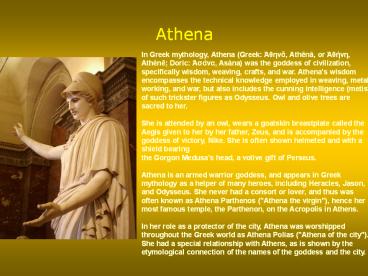Athena - PowerPoint PPT Presentation
Title: Athena
1
Athena
In Greek mythology, Athena (Greek ?????, Athenâ,
or ?????, Athéne Doric ?s??a, Asána) was the
goddess of civilization, specifically wisdom,
weaving, crafts, and war. Athena's wisdom
encompasses the technical knowledge employed in
weaving, metal-working, and war, but also
includes the cunning intelligence (metis) of such
trickster figures as Odysseus. Owl and olive
trees are sacred to her. She is attended by an
owl, wears a goatskin breastplate called the
Aegis given to her by her father, Zeus, and is
accompanied by the goddess of victory, Nike. She
is often shown helmeted and with a shield bearing
the Gorgon Medusa's head, a votive gift of
Perseus. Athena is an armed warrior goddess,
and appears in Greek mythology as a helper of
many heroes, including Heracles, Jason, and
Odysseus. She never had a consort or lover, and
thus was often known as Athena Parthenos ("Athena
the virgin"), hence her most famous temple, the
Parthenon, on the Acropolis in Athens. In her
role as a protector of the city, Athena was
worshipped throughout the Greek world as Athena
Polias ("Athena of the city"). She had a special
relationship with Athens, as is shown by the
etymological connection of the names of the
goddess and the city.
2
(No Transcript)
3
Athena is associated with Athens, a plural name
because it was the place where she presided over
her sisterhood, the Athenai, in earliest times.
Athena was probably already a goddess in the
Aegean in prehistoric times.There is evidence
that in early times, Athena was an owl herself,
or a bird goddess in general. In Book 3 of the
Odyssey, she takes the form of a sea-eagle. Her
tasseled aegis may be the remnants of wings she
is depicted with wings on Archaic red-figure
pottery.
4
(No Transcript)
5
Athena is associated with Athens, a plural name
because it was the place where she presided over
her sisterhood, the Athenai, in earliest times.
Athena was probably already a goddess in the
Aegean in prehistoric times.There is evidence
that in early times, Athena was an owl herself,
or a bird goddess in general. In Book 3 of the
Odyssey, she takes the form of a sea-eagle. Her
tasseled aegis may be the remnants of wings she
is depicted with wings on Archaic red-figure
pottery.
6
(No Transcript)
7
Fragments attributed to the semi-legendary
Phoenician historian Sanchuniathon, said to have
written before the Trojan war, make Athena the
daughter of Cronus, a king of Byblos who is said
to have visited 'the inhabitable world'
and bequeathed Attica to Athena.
8
In the Olympian pantheon, Athena was remade as
the favorite daughter of Zeus, born fully armed
from his forehead. The story of her birth comes
in several versions. In the one most commonly
cited, Zeus lay with Metis, the goddess of crafty
thought and wisdom, but immediately feared the
consequences. It had been prophesied that Metis
would bear children more powerful than the
sire,even Zeus himself. In order to forestall
these dire consequences, Zeus transformed Metis
into a fly and swallowed her immediately after
lying with her. He was too late Metis had
already conceived a child. Metis immediately
began making a helmet and robe for her fetal
daughter. The hammering as she made the helmet
caused Zeus great pain and Prometheus,
Hephaestus, Hermes or Palaemon (depending on the
sources examined) cleaved Zeus's head with the
double-headed Minoan axe (labrys). Athena leaped
from Zeus's head, fully grown and armed, and Zeus
was none the worse for the experience.
9
(No Transcript)
10
(No Transcript)
11
Athena was patron of the crafts, wisdom and
battle. Unlike Ares, who was hot-headed in
battle (as well as cowardly), Athena's domain was
strategy and tactics. She took the side of the
Greeks in the war against Troy. Following the
Trojan war, Athena assisted Odysseus on his
journey home, for Odysseus had angered Poseidon,
god of the sea, by blinding his son, Polyphemus
the Cyclops.
12
(No Transcript)
13
Athena, known to the Romans as Minerva, was born
of one of the many liasons of Zeus with the
goddesses of Mount Olympus.
14
Zeus lay with Metis, the goddess of thought, but
immediately feared the consequences. It had been
prophesised that Metis would bear children more
powerful than Zeus himself. In order to forestall
these dire consequences, Zeus swallowed Metis
immediately after laying with her. He was already
too late Metis immediately conceived a child.
While the exact circumstances are unclear,
shortly afterwards either Prometheus, Hephaestus,
Hermes or Palamoan (depending on the sources
examined) cleaved Zeus's head with an axe at the
the river Triton. Athena leaped from Zeus's
head, fully armed, and Zeus was none the worse
for the experience.
15
(No Transcript)
16
Athena became the patron goddess of the city of
Athens, in a competition with Poseidon. Poseidon
offered the Athenians a pool of salt, whereas
Athena offered them an olive tree. The
Athenians accepted the olive tree and along with
it Athena as their patron. This is thought to
remember a clash between the inhabitants during
Mycenaean times and newer immigrants. It is
interesting to note that Athens at its height was
a significant sea power, at one point defeating
the Persian fleet at Salamis in a sea battle.
Athena was also the patron goddess of several
other cities, notably Sparta. Athena is usually
portrayed wearing full armor and a shield, and
carrying a lance. It is in this posture that she
was depicted in Phidias's famous golden statue of
her, now lost to history, in the Parthenon on the
Athenian Acropolis.
17
(No Transcript)
18
(No Transcript)
19
(No Transcript)
20
(No Transcript)
21
(No Transcript)
22
(No Transcript)
23
Athena is also often depicted with an owl (a
symbol of wisdom) sitting on one of her
shoulders. It is interesting to note that
while Homer's epithet for Athena is usually
translated "owl-eyed", is can also be translated
as "grey-eyed" or "wise-eyed".
Nana Mouskouri_greek_music - Athina































